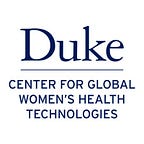GWHT Research Teams
Part 1: Ethanol Team
At the Center for Global Women’s Technologies (GWHT) our graduate students are working on three different projects; breast cancer, cervical cancer, and ethanol ablation. This week we want to tell you more about the Ethanol Team.
Advances in molecular technologies, imaging, and AI have increased the precision of cancer diagnosis. As the number of cancer diagnoses increases, more and more people will require access to essential surgery, the primary frontline treatment for many cancer types. Unfortunately, nine out of ten people in developing countries do not have access to basic surgical care, which requires skill and experience.
The time for new developing alternatives to essential surgery is now. Our Ethanol team is working on new methods to provide more affordable access to care.
Ethanol ablation, which causes coagulative necrosis of tissue, is a low-cost alternative to surgery that was originally used to treat inoperable liver cancers.
Ethanol ablation is the direct injection of pure ethanol into tissue to induce cell death. (1)
Ethanol is extremely leaky and hard to control, so it has fallen out of favor to more precise technologies, specifically radiofrequency and microwave ablation, in developed countries. However, like surgery, energy-based ablation approaches are simply not practical to implement when resources are over extended.
As we developed the pocket colposcope and tested it in the field, we realized that access to treatment is also a major issue. That inspired us to develop a very low-cost approach for effective ways to treat pre-invasive or invasive cancer once a lesion is identified. — Dr. Nimmi Ramanujam
Our team has developed a novel ablation method for cancer control that combines the precision of energy-based ablation technologies and the simplicity and cost-effectiveness of ethanol. Our approach mixes ethanol with ethyl cellulose, an inert, ethanol-soluble polysaccharide frequently used to coat medical pills and “Generally Regarded as Safe” by the FDA. Ethyl cellulose increases the viscosity of ethanol and in addition undergoes a liquid-to-solid phase change in aqueous media that creates a cotton-like gel in which ethanol is sequestered. This releases ethanol in the region of interest, while occluding pores and vessels that ethanol could leak through.
In 2017, graduate student, Robert Morhard made a discovery that influenced the way this team has been researching and working since then.
“After doing a few experiments I was cleaning out the containers and I noticed that when I added water a white gel formed. We hadn’t realized until that point that because ethyl cellulose is not water-soluble, it forms a white gel when mixed with water. — Robert Morhard
When our team used localized treatment of tumors, the ethyl cellulose-ethanol mixture was completely retained within the tumor, i.e., no leakage was observed. The ethanol and ethyl cellulose treatment completely annihilated the tumors one week after a single injection. In fact, 7/7 tumors injected with ethanol-ethyl cellulose completely regressed seven days after the initial injection, while none of the tumors regressed in the control (ethanol only) group.
Our simple method using a precise, automated injection device causes complete regression of tumors in pre-clinical models and induces increased T cell filtration to create a systemic immune response. This low-cost therapy can be paired with imaging for global cancer control and used as an adjunct to current therapies to augment the role of the immune system in preventing cancer recurrence.
Ethanol is known to destroy cells, so by injecting this liquid and converting it to a gel inside the tissue, we can locally target and remove regions of interest, much like a scalpel but without the need for a surgeon. So, we’re now working to develop a see-and-treat strategy for cervical pre-cancers using the low-cost therapeutic we have developed.
Read more about our Ethanol team’s research:
- Understanding Factors Governing Distribution Volume of Ethyl Cellulose-Ethanol to Optimize Ablative Therapy in the Liver
- Averting tumor growth in rodent breast cancer models with a liquid ablation approach
- Polymer-assisted intratumoral delivery of ethanol: Preclinical investigation of safety and efficacy in a murine breast cancer model
- Development of enhanced ethanol ablation as an alternative to surgery in treatment of superficial solid tumors
